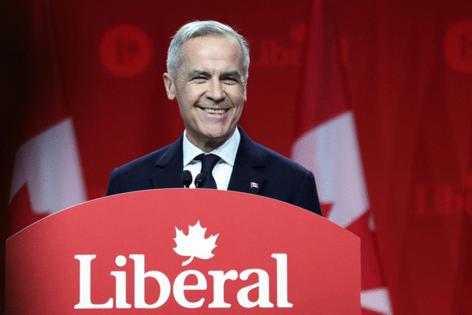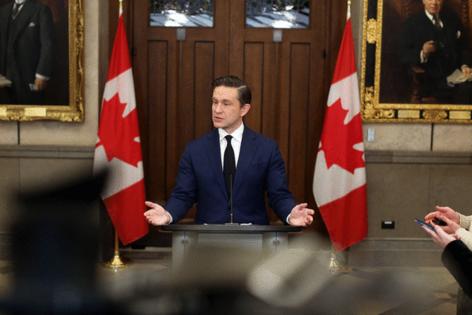Trump drama drowns out Canadian Conservatives' election message
Published in Political News
Pierre Poilievre seemed to be on an unstoppable march to political victory.
It was late December and Justin Trudeau’s government was in disarray. The Canadian prime minister had lost his finance minister, was deserted by key members of his party and had gone into hiding from the media. Poilievre’s Conservative Party, already well ahead in opinion polls, expanded its lead. As 2025 began, one projection had them on course to win two-thirds of seats in the country’s House of Commons, a landslide.
Poilievre can look back wistfully on that moment now. Trudeau is gone, Donald Trump has upended the world order, Canada is abuzz with talk about the president’s frequent threats — and the Conservatives’ lead has evaporated with little more than four weeks to go until election day.
338 Canada, a political data site started by a physics professor from Quebec, calculates that the Liberal Party, now led by former Bank of Canada Governor Mark Carney, has an 85% chance of securing a majority government on April 28. On Polymarket, bettors give the Liberals a 63% chance of winning the most seats.
Trump has a unique ability to dominate the political conversation. That’s truer than ever in Canada, where he has drowned out the debate on domestic issues with his barrage of tariffs and proclamations that the country should be the 51st U.S. state. At the moment, that appears to be playing into Carney’s hands.
Kory Teneycke, a longtime Conservative strategist who recently worked on Ontario Premier Doug Ford’s provincial election victory, said Poilievre needs to talk more about the U.S. threat and change his tone. “He sounds too much like Trump. He uses the lexicon of Trump,” Teneycke said at the Empire Club of Canada.
Carney, who speaks in the muted tones of a former central banker, does not have that problem.
Ironically, the slump in Poilievre’s political fortunes comes as he has achieved victory on some of his longstanding policy demands. Having helped end Trudeau’s political career, the Conservative chief has been forced to watch as Carney co-opts a number of his ideas.
Poilievre, 45, wanted to run the election on the economy and the cost of living, with a particular focus on the Liberals’ carbon tax, the centerpiece of a climate plan that Trudeau clung to even when it became unpopular. He relentlessly blamed the levy for exacerbating inflation and weakening Canada’s competitiveness — and was so successful that Carney’s first act as prime minister was to suspend the portion that consumers pay, despite having previously supported it.
With Trudeau gone, the carbon tax spurned, interest rates falling, and aggressive rhetoric and actions from Trump, the so-called “ballot question” has changed. Dealing with the volatile U.S. president has become the top issue in many voters’ minds.
And each time the White House threatens Canada’s sovereignty or announces a new round of tariffs, it offers Carney an opportunity.
When Trump signed an order Wednesday to impose 25% tariffs on automobiles built outside the U.S. — an existential threat to Canadian auto factories and parts makers that are responsible for one of the country’s biggest categories of exports — Carney tore up his campaign schedule and flew back to Ottawa to meet with members of his cabinet.
The next day, standing behind a podium and in front of a row of Canadian flags, Carney delivered a line that’s still reverberating around the nation that shares the world’s longest undefended border with the U.S.
“The old relationship we had with the United States, based on deepening integration of our economies and tight security and military cooperation, is over,” he said. On Friday, Trump and Carney had their first phone call since Carney became prime minister.
The first week of the election campaign sketched a pattern of Carney, 60, leaning into how he’d help Canada transition to a new, more distant relationship with the U.S., while Poilievre focused more on affordability and taxes.
On Monday, Carney stopped at the airport in Gander, Newfoundland, the town that welcomed thousands of stranded American airline passengers after the terrorist attacks of 9/11, an event that inspired the musical "Come From Away." That day, Poilievre unveiled an income tax cut larger than the Liberals’ proposal.
On Tuesday, Carney promoted a new defense policy at an east coast shipyard and talked about deepening partnerships with non-U.S. allies. Poilievre pledged to eliminate the sales tax on many new homes. The next day, he promised a tax reduction for working seniors.
On Thursday, while Carney addressed the government’s response to new U.S. tariffs, Poilievre proposed an expansion of tax-sheltered accounts for investors willing to put money into Canadian companies.
At a rally later that day in the Vancouver region, Poilievre gave a nearly 50-minute stump speech that was similar to the one he has been delivering for months. He mentioned Trump only three times, twice to draw parallels between the president and Carney, and said the Liberals are responsible for weakening Canada and putting it “under the American thumb.”
Andrew MacDougall, a communications consultant at Trafalgar Strategy and former spokesman for Conservative Prime Minister Stephen Harper, said in a message that “absent President Trump suddenly choking to death on his McDonald’s fries, Canada’s relationship with the United States will be the ballot question.”
“Poilievre will need to be strong on the U.S., while at the same time reminding Canadians that they were deeply unhappy before Trump went full psycho, and that the reason for their unhappiness was economic decisions people like Mark Carney had been making about their lives for the past 25 to 30 years,” MacDougall said.
Four weeks may not seem like much time for Poilievre to turn around his campaign. But polls are imperfect and Canadian history has shown, time and again, that big shifts in momentum can happen in the weeks before a vote.
Poilievre’s dilemma in hitting back too hard against Trump is that some of his supporters like the president, too. One attendee at his Thursday rally, Bret Jolliffe, was wearing a “Make America Great Again” hat as he entered the venue, but it was confiscated.
A poll taken in early March by Leger Marketing found that only 11% of Canadians have a favorable impression of Trump. Among Conservative Party supporters, the number was 26%.
At the start of the year, Poilievre did start to adjust his message to the new dynamic. But he could not resist borrowing a little from Trump’s “America First” stylings. The Conservatives’ slogan in this election: “Canada first — for a change.”
_____
©2025 Bloomberg L.P. Visit bloomberg.com. Distributed by Tribune Content Agency, LLC.































































Comments